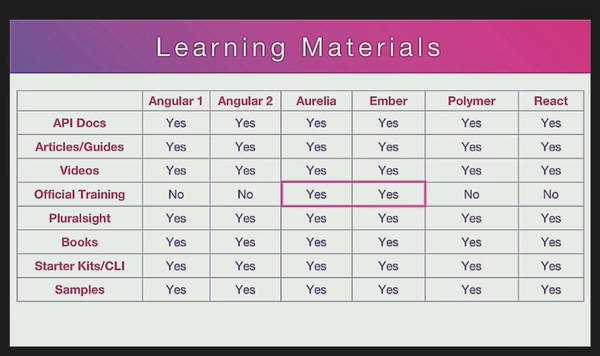Or, “why we don’t teach Aurelia”
Here at Oasis Digital and its sister company (Expium), we offer training and services concentrated around various languages and frameworks:
- Angular
- TypeScript
- Node
- The web platform in general
- JIRA, Confluence, and other Atlassian products (Expium is an Atlassian Solutions Partner)
There are many reason – technical, history, intentional, and accidental – around how we ended up with this set of technologies as our 2017 training and consulting focus.
I was reminded of one key factor today while watching a video from last year of a talk by Rob Eisenberg. Rob is exceptionally sharp, and seems to have a good sense of taste in designing frameworks for developer satisfaction. But I found myself in disagreement over his thoughts around web framework adoption. Rob argues that frameworks like his (Aurelia) are stronger, better choices to build on than frameworks like Angular and React, because first-party training and support services are available for Aurelia from the makers of Aurelia. This initially seems like a compelling pitch, I can see how it would woo some decision-makers. Here is a snippet of one of the slides along these lines, pointing out first party training as an advantage:

But I think ultimately this works out much less well than Rob describes. Why? Because this first party set of training and consulting offerings leave less space for a thriving commercial ecosystem to develop around a framework.
Let’s look at Angular for example. Here at Oasis Digital, we aim to be a leader among many firms around the world, who provide training, consulting, etc. for Angular. Our customers are quite happy with the availability of these services from many different companies; it reduces their risk and means they can shop around for the best fit. Moreover, because Angular has created opportunities for companies like Oasis Digital, it has facilitated a growing commercial ecosystem revolving around the framework. Much the same applies, for example, to React and Vue.js. This is a virtuous cycle. The non-service-offering core team leaves room for others to provide services, which in turn makes it easier and safer for customers to adopt the framework.
(A second example at Oasis Digital’s sister company Expium: Expium focuses entirely on the Atlassian product suite. While Atlassian offers online video training options, Expium’s offerings include things like live human training that don’t compete directly with Atlassian’s offerings. Atlassian enjoys a thriving commercial ecosystem.)
Of course it would be possible for companies like us to offer training and consulting focused on Aurelia. But we don’t want to do that; we like the people responsible for the framework. If we offered services for Aurelia, we would have an inherently competitive relationship with the company behind Aurelia, vying for the same customer opportunities.
This situation applies to various other frameworks and other technical specialties that we could choose to focus on; with so many choices, it inevitably feels wiser to choose those where we can be allied with the core teams rather than in competition with them.
I believe that overall, this is quite important in understanding why some frameworks gain enormous momentum and others do not. Creating this kind opportunity for a commercial ecosystem is an immense competitive advantage to those companies who can offer a framework without needing to build a business directly around it – like Google and Angular.
